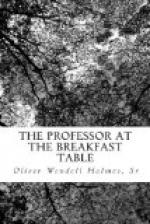in short, an almost uniform character, marked by beautiful
traits, which we look at with a painful admiration.
It will be found that most of these children are
the subjects of some constitutional unfitness for living,
the most frequent of which I need not mention.
They are like the beautiful, blushing, half-grown
fruit that falls before its time because its core
is gnawed out. They have their meaning,—they
do not-live in vain,—but they are windfalls.
I am convinced that many healthy children are injured
morally by being forced to read too much about these
little meek sufferers and their spiritual exercises.
Here is a boy that loves to run, swim, kick football,
turn somersets, make faces, whittle, fish, tear his
clothes, coast, skate, fire crackers, blow squash “tooters,”
cut his name on fences, read about Robinson Crusoe
and Sinbad the Sailor, eat the widest-angled slices
of pie and untold cakes and candies, crack nuts with
his back teeth and bite out the better part of another
boy’s apple with his front ones, turn up coppers,
“stick” knives, call names, throw stones,
knock off hats, set mousetraps, chalk doorsteps, “cut
behind” anything on wheels or runners, whistle
through his teeth, “holler” Fire! on slight
evidence, run after soldiers, patronize an engine-company,
or, in his own words, “blow for tub No. 11,”
or whatever it may be;—isn’t that
a pretty nice sort of a boy, though he has not got
anything the matter with him that takes the taste
of this world out? Now, when you put into such
a hot-blooded, hard-fisted, round-cheeked little rogue’s
hand a sad-looking volume or pamphlet, with the portrait
of a thin, white-faced child, whose life is really
as much a training for death as the last month of
a condemned criminal’s existence, what does he
find in common between his own overflowing and exulting
sense of vitality and the experiences of the doomed
offspring of invalid parents? The time comes
when we have learned to understand the music of sorrow,
the beauty of resigned suffering, the holy light that
plays over the pillow of those who die before their
time, in humble hope and trust. But it is not
until he has worked his way through the period of
honest hearty animal existence, which every robust
child should make the most of,—not until
he has learned the use of his various faculties, which
is his first duty,—that a boy of courage
and animal vigor is in a proper state to read these
tearful records of premature decay. I have no
doubt that disgust is implanted in the minds of many
healthy children by early surfeits of pathological
piety. I do verily believe that He who took
children in His arms and blessed them loved the healthiest
and most playful of them just as well as those who
were richest in the tuberculous virtues. I know
what I am talking about, and there are more parents
in this country who will be willing to listen to what
I say than there are fools to pick a quarrel with
me. In the sensibility and the sanctity which




